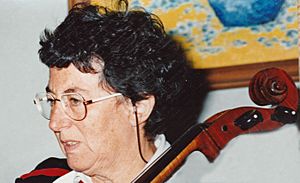Marion Créhange facts for kids
Quick facts for kids
Marion Créhange
|
|
|---|---|

Créhange playing cello
|
|
| Born | Marion Henriette Caen 14 November 1937 Nancy |
| Died | 28 March 2022 (aged 84) Vandœuvre-lès-Nancy |
| Resting place | Vandœuvre-lès-Nancy |
| Education | licentiate, doctorate |
| Alma mater |
|
| Occupation |
|
| Awards |
|
| Academic career | |
| Fields | Computer science |
| Institutions |
|
| Thesis | |
| Doctoral advisor | Claude Pair, Jean Legras |
Marion Créhange (born Marion Caen; 14 November 1937 – 28 March 2022) was a French computer scientist. She was a true pioneer in the world of computers. She was one of the very first people in France to earn a special advanced degree, called a PhD, in computer science back in 1961. This made her a very important figure in the early days of computing in France.
She was a leader in computer science at the University of Nancy. Her PhD thesis in 1961 was titled Structure du code de programmation. This work focused on creating a "macro-assembler" and a new tool for programming.
In 1976, Marion Créhange became a professor. She helped start the mathematics and computer science department at the University Nancy-I. Later, she worked on creating languages that help computers find information in databases. She also started a research group called Exprim, which stood for "EXPert for IMage Research." In 2017, she became a member of the Académie de Stanislas, a famous learned society.
Throughout her career, Marion Créhange always showed how computer science and other subjects, like arts and humanities, could help each other. She believed that computer science should encourage imagination and creativity. Her important papers and research notes were given to the Henri-Poincaré archives at the University of Lorraine in 2019.
Early Career and Research
Marion Créhange earned her advanced degree, her doctorate, at the University of Lorraine. Her advisor was Jean Legras. This was one of the first computer science PhDs ever given in France.
Her important thesis was called "Structure of programation code." In this work, she improved a computer program called IBM's Symbolic Optimal Assembly Program. She did this by creating something new called a macro-assembler.
Joining the CRIN Research Group
Créhange joined a research center known as CRIN. CRIN stands for "Center of Computer Science Research in Nancy." Here, she became an expert in information systems. These systems help organize and store large amounts of data.
In 1983, she started her own research group. It was called EXPRIM, which meant "Experts in Image Research." Later, she became a professor emeritus at the University. She worked at the LORIA research lab, continuing her important work.
Créhange was also a respected member of the Académie de Stanislas. This is a group of important scholars and thinkers.
 | Charles R. Drew |
 | Benjamin Banneker |
 | Jane C. Wright |
 | Roger Arliner Young |

